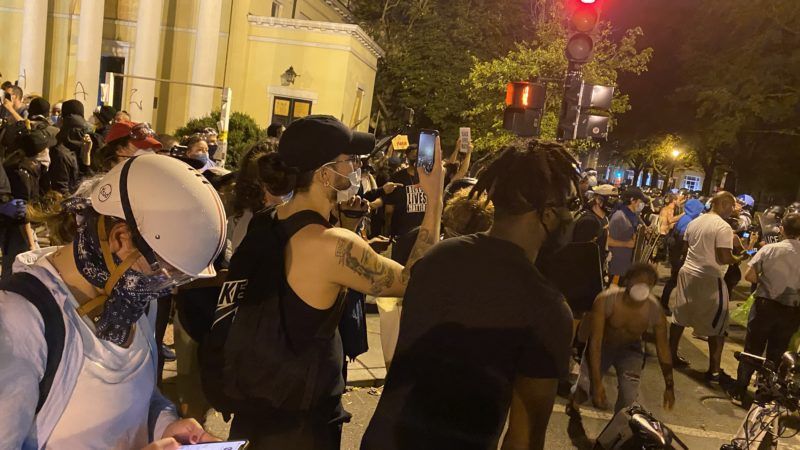Protesters Attacked a Journalist at the D.C. Protests. Then the Police Handcuffed Her.
A dispatch from the Black House Autonomous Zone

On Monday, protesters once again occupied the area just north of Washington, D.C.'s Lafayette Park, declaring it the "Black House Autonomous Zone." After a group of protesters failed to pull down a statue of President Andrew Jackson, the Park Police formed a line to prevent them from getting any closer to the park or the White House.
The scene on Monday night was by and large a peaceful one, with most of the protesters content to shout anti-police slogans in officers' faces. Others set up tents on and around the property of St. John's Church, the exterior of which had been vandalized: Protesters spray-painted the letters BHAZ on the church's columns.
But eventually, at about 10:30 p.m., I witnessed a hostile interaction between the protesters and a conservative journalist. A group of people surrounded Shelby Talcott, a reporter for The Daily Caller, and demanded to know why she was taking their pictures. Talcott identified herself as a journalist "with The DC" but did not give her last name or make her affiliation explicit. Though I had never met Talcott, I was able to guess who she worked for. (Disclaimer: I wrote for The Daily Caller in 2013, before joining Reason.)
At least one of the protesters voiced concerns that Talcott was an undercover cop, and several people tried to snatch her phone out of her hands. They yelled at her that she had to leave the area, even though plenty of other people—including me—had their phones out and were obviously taking pictures. One protester grabbed her backpack and shoved her toward the police, which caused an officer to shove the protester back. The situation then became quite tense as a whole mob of people jerked Talcott around while trying to take her phone. The police intervened and dragged Talcott behind their line so that the protesters couldn't get to her.
But then they put her in handcuffs—ostensibly for her own safety, but of course at that point she was perfectly safe, and no threat to the police. They also told her that they could arrest her for unlawful assembly, treating her like she was a misbehaving member of the mob, rather than its target. When she objected that she was a journalist, they suggested her coverage of the protests was probably unfair. She was ultimately released.
Young activists are often hostile to members of the media, particularly if they perceive journalists as not explicitly on their side. That's a regrettable habit. Ironically, it's something they have in common with the cops.
